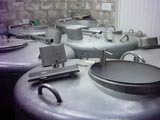 |
 |
 |
SCIENTIFIC DEPARTMENTS
|
 |
OTHER (SUPPORT) DEPARTMENTS
|
 |
COUNCILS & CHAIRS
|
 |
PUBLICATIONS & JOURNALS
|
 |
 |

|
Interdepartmental Scientific Center
for Cryobiology and Cryomedicine Cell and Tissue Transplantation: Advantages and Perspectives Within the recent decade there is an intensive development of new direction in medicine: cell and tissue transplantation, that is the application of biopreparations derived from tissues and cells of embryofetoplacental complex (EFPC) of allo- and xenogenic origin. At the same time the actual pharmacological means unfortunately do not always justify the hopes, especially when curing the diseases with a long proceeding, metabolic disorders and other pathological states, stipulated by the combination of different diseases in one patient. For a long time the fetal tissues have been used as stimulators. There were the animal tissues (xenogenic transplants) or cadaveric tissues and their fragments. For many years the usage of fetal tissues remained in a greater extent the medicine history and modern fundamental science endowment without finding the proper place in a combined treatment of diseases. The efficiency of biopreparations is proved by the results of experimental and clinical elaborations, that is reflected in a special scientific literature and mass media reports. The essence of cell and tissue transplantation and therapy consists in the activation of compensatory resources of damaged cells and tissues, stimulation of new mechanisms of recovery and regeneration, substitution of the lost structures and functions of an organism, organ or tissue. The effect mechanism of cryopreserved viable biopreparations is based on the preservation after thawing of the integrity in cells, tissues and/or containing in them biologically active substances of natural origin with a multidirected pharmacological effect. The advantage of applying tissue and cell biopreparations is the fact, that a patient receives some biologically active, balanced compounds of natural origin, capable to affect different sides of metabolism of the whole organism, as well as the cells, capable to realise the substitutive functions. Fetal cells and tissues are more plastic, the proliferation rate in them is significantly higher, than in mature structures, they are capable to differentiate depending on microenvironment. EFPC tissues contain a big amount of different activators of regeneration and differentiation such as: growth factor of fibroblasts, growth factor of nerves, growth-stimulating factor of macrophage and erythroid colonies, as well as anti-proliferative cytokines, preventing cell and system hyperstimulation. Fetal cells and their associates are not practically immunogenic, because in 1 and 2 gestation trimester the histocompatibility proteins of 1 and 2 class are not expressed on them. The metabolism peculiarity of fetal cells provides their higher resistance to different unfavourable factors, accompanying the cryopreservation process.
23, Pereyaslavskaya str., Kharkiv, Ukraine 61015 Institute for Problems of Cryobiology and Cryomedicine of the National Academy of Sciences of Ukraine Tel: +380 57 373 4143, 373 3807, 373 3039; Fax: +380 57 373 3084 E-mail: cryo.ua@gmail.com |